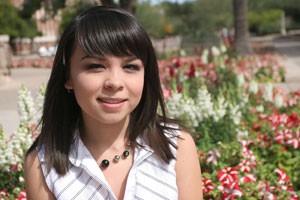Women make up only 12 percent of the science and engineering work force, according to the National Council for Research on Women.
That’s why, when six female undergraduates from the UA were recently asked to present their research at a large-scale national science conference, it turned some heads.
“”The fact that they are women is a testament to the efforts of this university has made to encourage more women to pursue science careers,”” said Carol Bender, director of the UA’s Undergraduate Biology Research Program and Related Programs. “”And the fact that they are undergraduates underscores the commitment UA has to undergraduate research.””
UA undergraduates presenting at Experimental Biology 2008
Stacey Borrego
Senior majoring in molecular and cellular biology, biochemistry and molecular biophysics
- Presenting: Tuesday
- Topic: Iron metabolism protein
- Focus: Reducing the population of mosquitoes
Jamie Elliott
Senior majoring in nutritional sciences and dietetics
- Presenting: Tuesday
- Topic: Iron metabolism in African malaria mosquito
- Focus: Decreasing the transmission rate of malaria
Alice Ferng
Senior majoring in molecular and cellular biology, biochemistry and molecular biophysics
- Presents: Monday
- Topic: Tissue engineering
- Focus: Helping osteoarthritis patients regenerate damaged knee cartilage rather than replace it surgically
Sarah Nelson
Junior majoring in biochemistry and molecular biophysics, and molecular and cellular biology
- Presenting: Sunday (for David S. Bruce Undergraduate Research Award), Wednesday
- Topic: Effects of vasopressin on kidneys’ ability to concentrate urine
- Focus: Understanding mechanisms of diabetes, congestive heart failure and other diseases to develop treatment
Megan Paul
Senior in biochemistry and molecular biophysics and microbiology
- Presenting: Monday
- Topic: Plant response to heat stress
- Focus: Humans heat-shock proteins; previous research has implicated these proteins as important to a cure for breast cancer
Lissette Velasquez
Biology senior
- Presenting: Monday
- Topic: Iron-binding proteins in mosquitoes
- Focus: Contributing to pathogen and vector-control strategies
Seniors Stacey Borrego, Jamie Elliott, Alice Ferng, Megan Paul and Lissette Velasquez, and junior Sarah Nelson, are set to attend Experimental Biology 2008.
To present at the meeting, an individual needs to have made significant research findings worthy of being shared with the scientific community, Bender said.
“”It is great for the UA to have so many students attending and presenting at EB, because it gives UA visibility and promotes the idea that undergraduate researchers are an important and valued part of the scientific community on our campus,”” Bender wrote in an e-mail.
The annual meeting draws thousands of scientists from different countries and areas of focus to present their research to their colleagues.
This year’s conference will be held tomorrow through Wednesday in San Diego, with a theme of “”Today’s Research: Tomorrow’s Health.””
More than 13,000 scientists are expected to attend, each toting a poster to be displayed and presented twice during the conference.
Nelson will present her research during a scheduled time and also as part of a special research competition for undergraduates.
Nelson was chosen as one of the 20 finalists for The American Physiological Society’s 2008 David S. Bruce Undergraduate Research Award. She had to apply to be considered for the award and will have interviews with panel members along with a presentation Sunday.
“”It’s always nice to receive recognition for the work that you do,”” Nelson wrote in an e-mail. “”I will have the opportunity to present my research to even more people.””
Like many undergraduate EB participants, senior Megan Paul has never shown her work at a national conference.
“”It is very intimidating,”” Paul wrote in an e-mail. “”I have never been in the same group as non-undergraduates, and I am much less experienced and educated than the vast majority of people there.””
Nelson, Borrego and Velasquez expressed similar feelings.
“”I know that the crowd at the EB conference will be composed of highly knowledgeable scientists who will have insightful comments and questions on my research,”” Velasquez wrote in an e-mail. “”I think I am more nervous about answering their questions than I am actually presenting my poster.””
Scientists from all disciplines are needed to solve many scientific problems today, which the conference addresses through its attraction of scientists from various backgrounds, Bender wrote.
“”A physiologist looking at a scientific poster or attending a scientific talk at the meeting might be able to suggest an approach to a problem presented by, for example, a nutritionist, that the nutritionist may not have considered,”” Bender wrote.
Borrego wrote in an e-mail that she hopes to “”gain better insight about my current projects as well as expand my knowledge about the many opportunities currently available in research.””
Velasquez wrote that she has already mapped out two seminars she plans to attend that will be useful to her graduate studies in biological sciences.
Elliott wrote that she is particularly excited to see the new research in the nutrition field, as she plans to go to graduate school in nutrition.
Networking is another important aspect of the conference, Bender wrote.
“”The people students meet at the conference can advise them about graduate and professional programs at different institutions,”” she wrote. “”The students may make a connection that can help them gain admission to these programs.””
Velasquez plans to use this additional benefit.
“”I hope to network with research scientists and graduate school representatives from around the nation,”” she wrote. “”Such acquaintances may be able to help me achieve my dreams of pursuing a Ph.D and career in science.””









